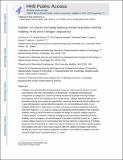ColGen: An end-to-end deep learning model to predict thermal stability of de novo collagen sequences
Author(s)
Yu, Chi-Hua; Khare, Eesha; Narayan, Om Prakash; Parker, Rachael; Kaplan, David L; Buehler, Markus J; ... Show more Show less
DownloadAccepted version (771.2Kb)
Publisher with Creative Commons License
Publisher with Creative Commons License
Creative Commons Attribution
Terms of use
Metadata
Show full item recordAbstract
Collagen is the most abundant structural protein in humans, with dozens of sequence variants accounting for over 30% of the protein in an animal body. The fibrillar and hierarchical arrangements of collagen are critical in providing mechanical properties with high strength and toughness. Due to this ubiquitous role in human tissues, collagen-based biomaterials are commonly used for tissue repairs and regeneration, requiring chemical and thermal stability over a range of temperatures during materials preparation ex vivo and subsequent utility in vivo. Collagen unfolds from a triple helix to a random coil structure during a temperature interval in which the midpoint or Tm is used as a measure to evaluate the thermal stability of the molecules. However, finding a robust framework to facilitate the design of a specific collagen sequence to yield a specific Tm remains a challenge, including using conventional molecular dynamics modeling. Here we propose a de novo framework to provide a model that outputs the Tm values of input collagen sequences by incorporating deep learning trained on a large data set of collagen sequences and corresponding Tm values. By using this framework, we are able to quickly evaluate how mutations and order in the primary sequence affect the stability of collagen triple helices. Specifically, we confirm that mutations to glycines, mutations in the middle of a sequence, and short sequence lengths cause the greatest drop in Tm values.
Date issued
2022Department
Massachusetts Institute of Technology. Department of Civil and Environmental EngineeringJournal
Journal of the Mechanical Behavior of Biomedical Materials
Publisher
Elsevier BV
Citation
Yu, Chi-Hua, Khare, Eesha, Narayan, Om Prakash, Parker, Rachael, Kaplan, David L et al. 2022. "ColGen: An end-to-end deep learning model to predict thermal stability of de novo collagen sequences." Journal of the Mechanical Behavior of Biomedical Materials, 125.
Version: Author's final manuscript